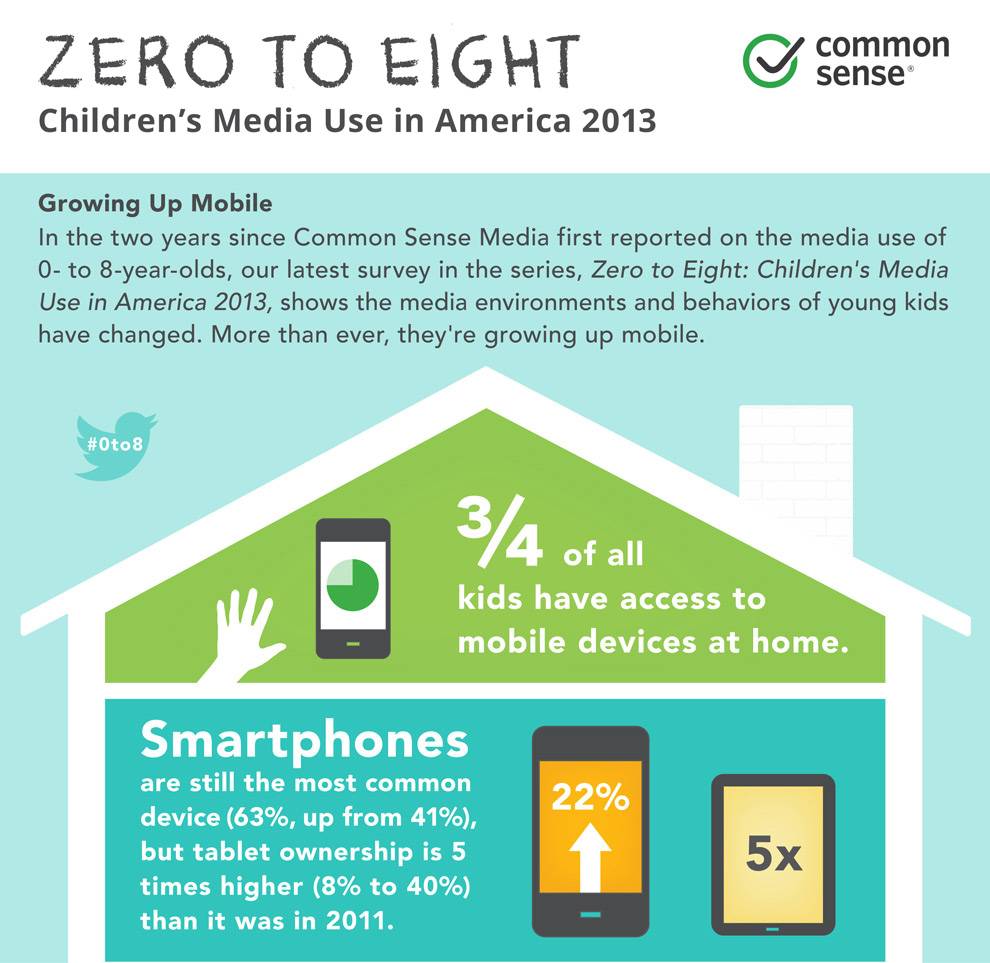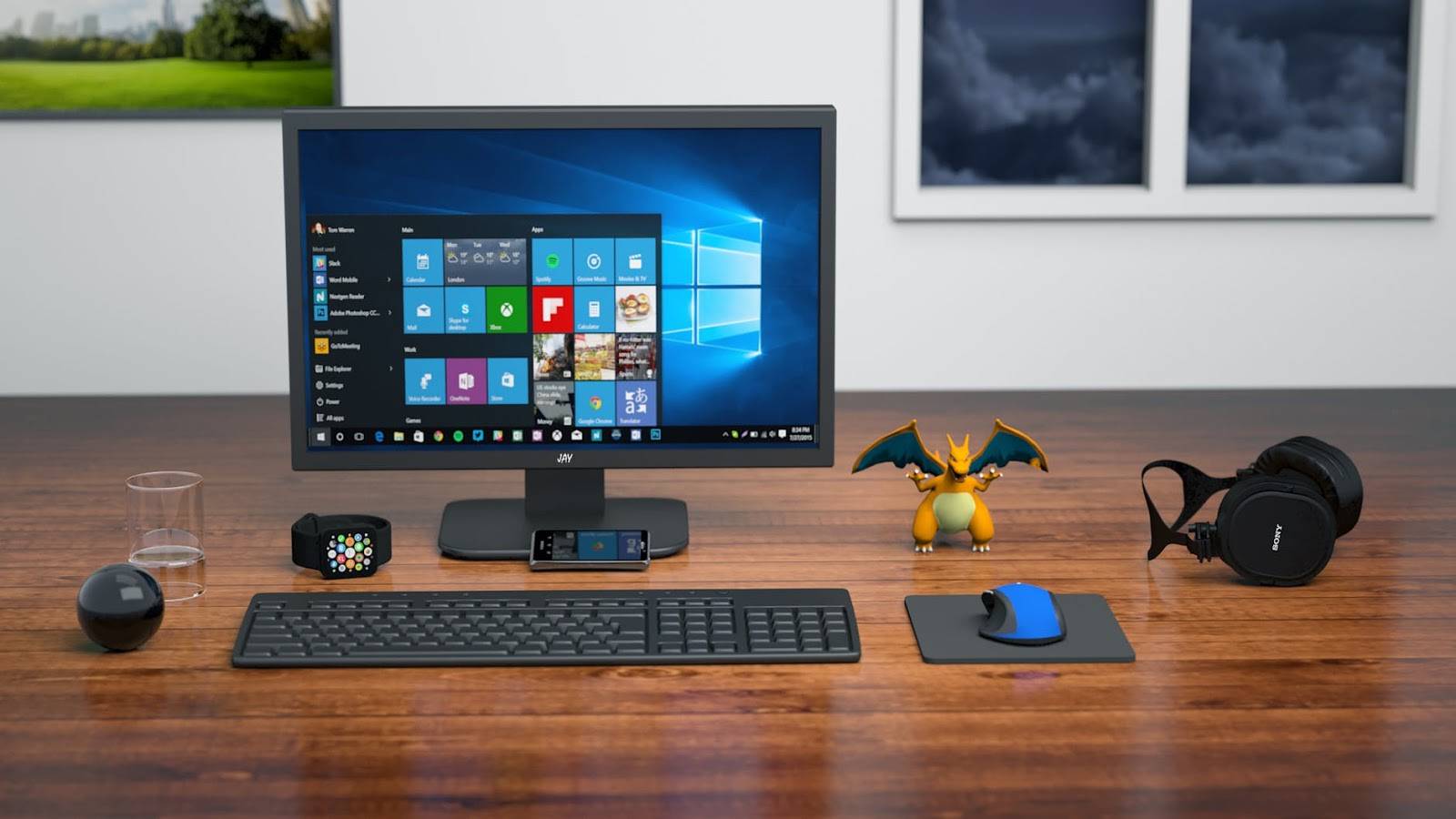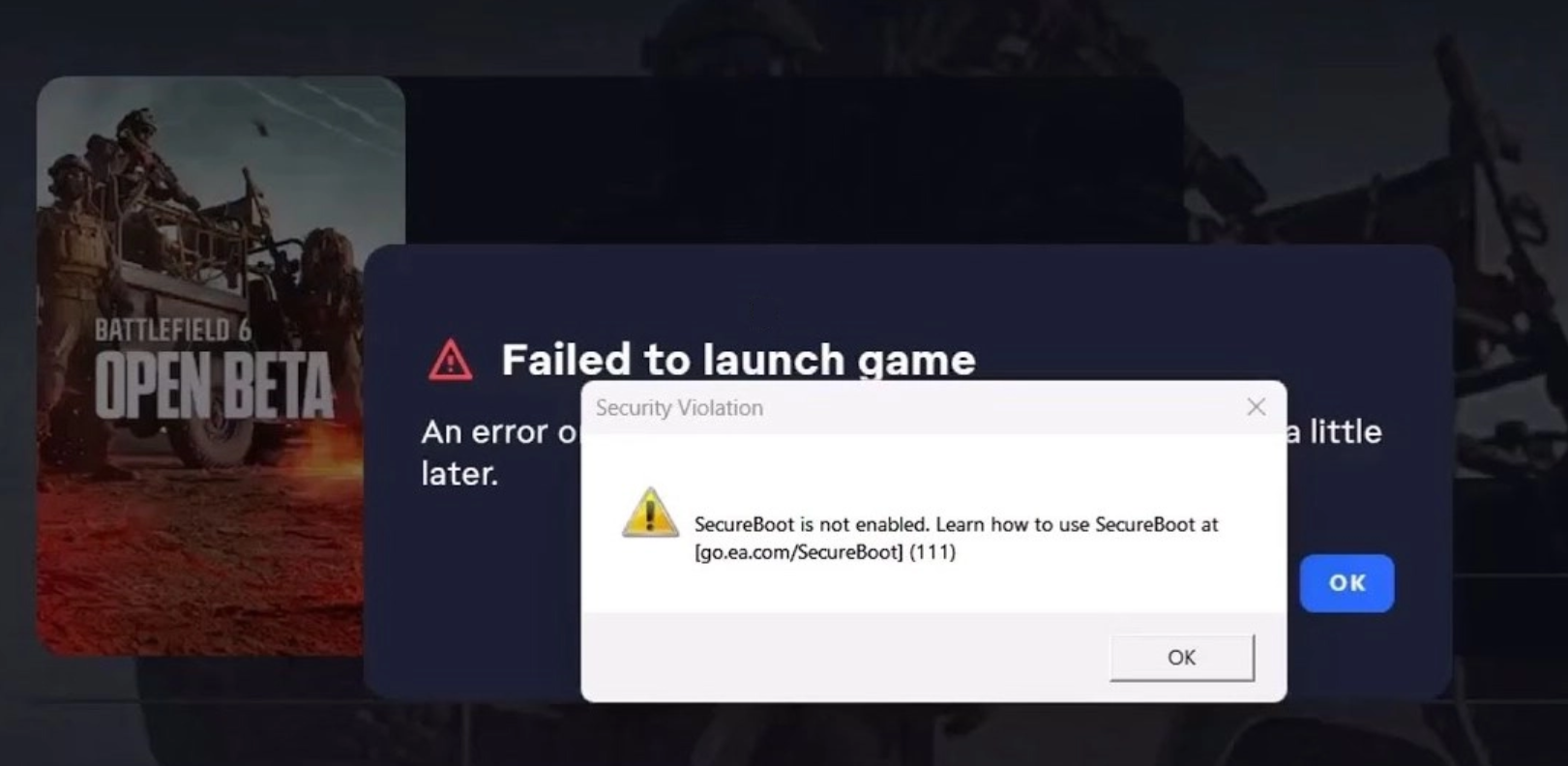This content has been archived. It may no longer be relevant
With technology becoming such a huge part of American culture, it is no surprise that cell phones, tablets, and computers are changing the lives of America’s youth every day. Many media outlets and institutions have been bashing the use of electronics by teens and children, arguing that this “screen time” is detrimental. Recently, a non-profit parent research group, Zero to Three, put together a list of the top 5 Myths About Young Children and Screen Media. Their research revealed a study by Common Sense Media that showed that 38% of children under the age of 2 have used a mobile device, and children under the age of 8 spend an average of nearly 2 hours in front of the television, plus another 15 minutes per day playing on a mobile device. Here are myths about babies and screen time.
Myth #1
The first myth tackled by the parents at One to Three was that all screen time is detrimental to children. The fact of the matter is, children can learn from age-appropriate screen media when parents are involved. Screen time is most effective when it can be connected to the life of the child; involve children in the problems on the screen so that they may learn how to solve similar problems in real life. Connecting what is on the screen to what a child does not only reinforces the lessons learned from the screen, but also offers a new first-hand experience to the child.
Myth #2
Everybody is likely guilty of performing some mindless task like folding towels with the television playing in the background, which is why the second myth addressed by One to Three is that playing television in the background does not affect your kids. In reality, children’s attention spans are generally quite short, meaning that even if they are focused on something, a familiar character’s voice, or the theme song of their favorite show could easily take their attention off of a constructive task and towards sitting motionless and watching television. Another point the research group makes is that if the television show playing in the background is not age appropriate, their cognitive, and language development may suffer, as well as their executive functioning.
Myth #3
The third myth challenged was that television at bedtime lulls kids to sleep. A UC Berkeley study showed that children that had televisions in their rooms slept an average of 18 minutes less than those who did not; the results also showed that kids with easy access to mobile devices go to bed 37 minutes later and sleep for 21 fewer minutes each night than those who do not. Studies have shown that the light from televisions or mobile devices suppresses melatonin, which makes falling asleep more difficult. Although some parents may encourage leaving the television on until their child falls asleep, they are actually making it harder on their child to fall asleep and stay asleep.
Myth #4
The research conducted by One to Three did not only address development and physical affects of mobile device and screen usage, but also the psychological affects. The 4th myth that was disproved was that parent cell phone use does not impact kids. When parents are constantly tied to their cell phone while around their families, children are more likely to act-out sooner. A parent who switches their attention from child to phone as soon as it rings is likely to cause a child to act out, and in turn the parent to respond more irritably since he or she is on the phone. This is destructive behavior for children and families all together.
Myth #5
The 5th and final myth refuted by the parent research group is that the more interactive a screen experience is, the better for kids. Although it is true that most interactive screen time is better than idol time spent just watching and listening, certain screen interactions may cause distractions from the task at hand. For instance, and ebook with moving images and changing graphics may cause a child to get side-tracked from the actual reading. The incorporation of games and activities in ebooks also makes it more difficult for children to follow a story line.
What Does It Mean?
So, what can parents take away from the research done by One to Three? The answer is that they must be actively involved in what their child is using screens and mobile devices for. There are benefits to allowing your child screen time, but this use must be within a clear and consistent time limit, as well as knowing when and where your children are when engaging with technology. The most important thing; however, is the content of their engagement. By being involved in your child’s screen time, parents can ensure that technology is used in a positive, constructive manner.
Video Transcript
Courtney: We’re going to take it over to Ken, who’s finding out the answer with our good friends from Nerds On Call.
Ken: Always good to see Ryan. [inaudible 00:05] Ryan…
Courtney: What are you giggling about?
Ken: What’s that? Oh, because he always does something that makes me laugh. Plus, we have kids, so we kind of talk
about that, and this is one of those things that’s really important for parents with young children.
Ryan: Yes.
Ken: We all have them using some sort of mobile device at some point and now we kind of need some guidelines.
Ryan: We used to pop a pacifier in their mouth…
Ken: Yes.
Ryan: …to keep them from screaming.
Ken: Right.
Ryan: Well, now we give them a mobile device or a tablet and say, “Here, watch some Thomas the Train. Leave Daddy
alone!”
Ken: Yeah, “Leave me alone,” that’s Daddy. I do that a lot. I’m sorry.
Ryan: So, three-quarters of all children under eight have access to a mobile device and know how to use it.
Ken: Yeah.
Ryan: But here’s kind of an interesting fact, is that 38% of toddlers that are under two know how to use a cellphone.
Ken: Wow!
Ryan: How cool is that?
Ken: On one hand, it’s kind of crazy. On the other hand, it’s kind of cool.
Ryan: Well, we’ve got to get them trained fast because otherwise they’re not going to be able to fix our stuff later when
we get old and decrepit.
Ken: That’s a good point. That’s solid.
Ryan: Let’s talk about the top five myths about screen time and kids.
Ken: Okay.
Ryan: So, the first one is that all screen time is detrimental. We’ve all heard, “Don’t sit your toddler in front of a TV and
then walk away.” That’s still bad. But if they’re watching an episode of, like, Daniel Tiger and Daniel Tiger hides his toys
from his friends, then talk to them about it and say, “Hey, how would you feel if your friends hid their toys? What would
you do differently than what Daniel Tiger did?” And bring the screen time, what they see on the screen, into real life.
Ken: Got it.
Ryan: If they see a show about birds, walk around the neighborhood and point out birds to them, and then it becomes
real, and an interactive experience with their parents.
Ken: What about watching Caillou?
Ryan: Well, I hate Caillou.
Ken: Thank you.
Ryan: He’s so whiny.
Ken: You can stay.
Ryan: Don’t every watch Caillou.
Ken: No one likes Caillou. Okay.
Ryan: Block him on Netflix. He’s terrible.
Courtney: Hate Caillou.
Ryan: So, number two: Children aren’t impacted by TV in the background. Sometimes, you know, we’re cleaning the
house or we’re doing something and the TV’s just kind of on in the background, and the kids are playing with their blocks
and their stuff, and we go, “They’re not watching Judge Judy anyway, so what do they care?” Well, if they hear a word
that they know or a tone of voice that sounds kind of like, “Whoa,” they’re building their blocks, they get distracted by it,
and it can affect their cognitive development and their language development.
Ken: Oh, wow, okay.
Ryan: So, if it’s in the background, just turn it off, especially if it’s not child appropriate.
Ken: Okay.
Ryan: Next is, TV at bedtime can lull the kids to sleep. You know, my kids, they love to watch little videos before they go
to bed, but it suppresses melatonin and it actually makes them sleep less. Kids who have TV in their room get to bed 37
minutes later and get 18 minutes less of sleep. That’s almost an hour less of sleep if they have a TV or a mobile device in
their room.
Ken: That’s not good. Yeah.
Ryan: That’s pretty terrible. So, if you have a cellphone, and you’re using your cellphone all the time, that’s terrible. Kids
are learning that behavior from you, and they’re learning, in fact, they’re learning that that cellphone, sometimes, is
more important than they are. So, what they found is…they did a study in fast food restaurants of about 40 parents.
They watched 55 parents total and 40 parents of them, within a few minutes of being sitting down and eating, they
pulled out their cellphone. Their kids acted up more often, and then the parents reacted harshly when the kids did act
up.
Ken: Bad combination.
Ryan: So, keep your cellphone in your pocket.
Ken: Okay.
Ryan: Next, it’s the last one: Interactive screen time for kids is the best. So, like, let’s say you’re reading an e-book, and
Thomas the Train has these great e-books, and the train kind of comes out and makes noises.
Ken: Yup.
Ryan: The problem is, is all those noises and distractions distract them from the story and then they start clicking on
stuff.
Ken: Just to hear the noises.
Ryan: Yeah. Isabella, my baby girl, she’ll just sit there and poke at something because she thinks it’s funny, but she’s not
paying attention to the story at all, and she’s not getting as much as she could if it was just a regular book that just she
flips through.
Ken: Wow, interesting. I like that, five myths that people didn’t know about, but now you know the real deal on these
myths. And, you know, I had a question. What if I have sports on in the background because I’m trying to train him. He’s
going to be a football player or a baseball player, Ryan.
Ryan: Well, I would sit down with him and go over the plays with him.
Ken: No, we do that, but then I have it on in the background. It’s always on in the background.
Ryan: In general, if you’re having it in the background and the kids are doing something else, they’re still picking up and
hearing that noise, and that speech and stuff, and if they’re not paying attention to it, it can harm their cognitive
thinking and some of their language skills. So, it would be best to just turn it off, or watch it with them and then talk to
them about it.
Ken: All right.
Ryan: Say, “When Daddy throws the football, you’ve got to catch it like that guy did.”
Ken: “Yes, [inaudible 04:04], and bring it into your body.”
Ryan: “Don’t do what Tom Brady does.”
Ken: “The hands, bring them into the body.” Ryan, always good to see you, and you can stay now because you don’t like
Caillou like the rest of us.
Ryan: Thank you.
Ken: Courtney, we’ve got to start a whole petition to get rid of Caillou.
Courtney: Hashtag – can’t stand Caillou.
Ken: Hashtag – you got to go, Caillou!
Courtney: Hashtag – whiny four-year-old. Thanks.
Video Transcript
Alex Delgado: Hi we are back with our tech expert, Ryan Eldridge of Nerds On Call, with more on what parents can do to cut and limit screen time for our kids. Ryan, I did want to ask you before we get to some of your stuff that you have here. What about those people that say, “Well, you know, I want my kid to be tech savvy. And the more they use a computer and the more they play with their iPad’s, the more they will know.”
Ryan: Yeah, well it turns out that’s a perfectly valid point of view to have, but I use a calculator sometimes for simple division, but I still know how to divide. Whereas kids if you just hand them a calculator and say, “Hey, figure out how to do blah-blah-blah.” They’ll figure it out, but they won’t know the fundamentals of how to get there.
Alex Delgado: Good point.
Ryan: We were just talking about my son. He’s six. In his school, one of his chores, one of his tasks, is to sew. Sewing in school! That’s kind of cool. These kind of practical life things, sometimes they lose touch, you know in a digital age.
Alex Delgado: They really do.
Ryan: But they do need to know how to do that stuff. So I would say, balance everything. You know, you want to make sure that they get an exposure to both electronics and practical life skills.
Alex Delgado: I saw this app on Facebook. It’s like a math app where you just put it over the problem…
Ryan: Yeah!
Alex Delgado: …on the worksheet and it does it for you. It works it out for you.
Ryan: And we don’t even need to translate anymore, Google Translate will do the same thing with menus or whatever when you’re traveling. And now Siri will actually tell you in your ear what the other person is saying as they are saying it. So you don’t have to do that anymore. So why learn another language?
Alex Delgado: That’s crazy. All right. So you’ve got five tips.
Ryan: Yeah so, we were talking about kid’s screen time and how 38% of kids under two have used some sort of cell phone or mobile device.
Alex Delgado: Crazy.
Ryan: And so there are myths that go around about kids and screen time. Isn’t all screen time detrimental, that’s myth number one. Well, not all screen time is detrimental. We talked about educational video games and things like that. Those are perfectly fine to use. But if kids are watching television and they’re watching an episode, we want to make sure that the parents get involved in the episode. And then correlate what’s in the episode to real life. Here’s an example. So let’s say we were watching…my three year old loves Daniel Tiger, which is kind of the modern day Mr. Rogers. If you’re watching that episode you say, “Well, what did Daniel…why did Daniel hide his toy from his friends?” And then you’re little one will tell you. Then you say, “What would you do if one of your friends hid their toy?” And now you’re interacting with your kid about what happened on the screen rather than just sitting there and mindlessly absorbing that stuff.
Alex Delgado: That’s a great idea and we can do that with a lot of these shows that they watch on the Nickelodeon. That are a little older, you know, teenage kid shows. And they can learn a lot from a lot of life lessons on that if you help them. Okay, go on.
Ryan: Okay, myth number two is that having a TV playing in the background doesn’t affect my children. So sometimes you have little toddlers, or even pre-language children that are sitting and playing and we’re watching you know, something on the television. Like Central LA Today, or something cool like that. And we’re thinking, “This is beyond them, they’re not paying attention anyway.” Well, kids are really tuned into their environment and they’re hearing words every now and then that they know. They’re hearing a tone of voice, and it distracts them. They’re playing with their blocks and they go “What was that?” And then it goes back, and this has been linked to being able to concentrate, as well as cognitive use, or language skills. Simply because of TV on in the background. So, if you’re not watching it or it’s not kid appropriate, just turn it off and don’t let the noise come from somewhere else, maybe when they throw their blocks down.
Alex Delgado: Good advice.
Ryan: So, myth number three is, I’ve been guilty of this before, is that kids fall asleep better watching television. Like, you’ll put them in front of the TV and a few minutes later they pass out. And you’re like, “Awesome, this is great for kids!” Well, it isn’t really great for kids. It suppresses melatonin and it actually makes them less able to sleep. In fact studies have shown that kids with televisions in their room go to bed 18 minutes later than most kids. And if they have access to a mobile device in their room, they go to sleep 37 minutes later and get 18 minutes less of sleep. They wake up 18 minutes later, nearly an hour less of sleep every night just for our kids because of these mobile devices.
Alex Delgado: Okay, and they need all the sleep they can get.
Ryan: They do!
Alex Delgado: Okay, myth number four.
Ryan: So, myth number four, that cell phone usage by parents doesn’t impact kids. Well, we just talked about that. It does. They see our behavior, they see us playing with something and they start wanting to mess with it too. Kids as early as one will crawl to a cell phone because they’re going, “Why is mom playing with that thing so much? I want to play with it too.”
Alex Delgado: Makes sense.
Ryan: So you want to make sure you limit your own usage of your cell phone and if you’re going to make a rule for your kids to follow, follow it yourself so you can model the behavior. Maybe just, whenever you’re going into the restroom bring your phone in there and then they won’t see it, right?
Alex Delgado: They sometimes…they still get in there, you know, Ryan. Sometime they still get in there with us. Okay, number five.
Ryan: Myth number five, interactive games or things like that are better than just watching television. So we even talked about this a couple of weeks ago. So, it’s perfectly true on most things. So it’d be better to sit a kid in front of Monkey Preschool Playhouse on an iPad than letting him watch Spongebob Squarepants. But a lot of times these e-books, they have unnecessary distractions. So if you get a Thomas the Train book, what will happen is you’ll start reading it, you press some things, and the train will make some noise. Or you’ll make a little sound, or some music will come on, or the train will move. All of those things are distracting from the story and the kids have trouble following the plot. So imagine if you, as an adult, you’re reading one of the greatest new thrillers out, and you’re like “Oh this is so good!” But every chapter you have to stop and play a quick round of Angry Birds. You would not be able to follow that plot and there would be twist and turns and you would be like “Oh okay, I’m just going to have to go back and read this” Well our kids don’t even have that much ability to concentrate. So if you’re going to have them read, and you’re going to be with them while they’re doing it, make sure they’re interactive. But interactive appropriately so that way they’re not too distracted
Alex Delgado: Great tips Ryan. Thank you so very much. Nerds On Call everybody. They’re on Champlain Street, 800-919-NERD is the number. Call them if you need anything tech. Anything tech, he’s your man. Thank you so much for being here, Ryan. Always great talking to you. Don’t go anywhere especially if you’re hungry. The folks from Marie Calender’s are here to show us how to make one of their most popular side dishes, A Bacon Cheese and Avocado Hasher.







